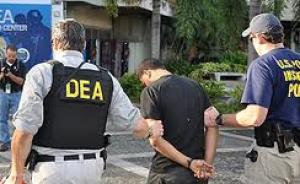This article was produced in collaboration with AlterNet and first appeared here.f
Despite spreading marijuana legalization and despite a growing desire for new directions in drug policy, the war on drugs continues unabated. According to the FBI's latest Uniform Crime Report, released Monday, overall drug arrests actually increased last year to 1.57 million, a jump of 5.63% over 2015. The increase includes marijuana arrests, which jumped by more than 75,000 last year compared to 2015, an increase of 12%.

Unlike previous years, this year's Uniform Crime Report did not immediately make available data on specific offenses, such as drug possession or drug sales, nor did it break arrests down by type of drug, but the Marijuana Policy Project obtained marijuana arrest data by contacting the FBI. It reported some 653,000 people arrested on marijuana charges last year, although the FBI did not provide data on how many were simple possession charges.
While that figure marks a decline from historic highs a decade ago -- pot arrests peaked at nearly 800,000 in 2007 -- the sharp jump in pot arrests last year demands explanation, especially as it comes after a decade of near continuous declining numbers.
"Arresting and citing nearly half a million people a year for a substance that is objectively safer than alcohol is a travesty," said MPP communications director Morgan Fox. "Despite a steady shift in public opinion away from marijuana prohibition, and the growing number of states that are regulating marijuana like alcohol, marijuana consumers continue to be treated like criminals throughout the country. This is a shameful waste of resources and can create lifelong consequences for the people arrested."

That means that of the more than 1.5 million drug arrests last year, probably 1.3 million or so of them were not drug kingpins, major dealers, gangbangers, or cartel operatives. Instead they were people who got caught with small amounts of drugs for personal use.
"Criminalizing drug use has devastated families across the US, particularly in communities of color, and for no good reason," said Maria McFarland Sánchez Moreno, executive director of the Drug Policy Alliance. "Far from helping people who are struggling with addiction, the threat of arrest often keeps them from accessing health services and increases the risk of overdose or other harms."
Perpetuating the war on drugs leads not only to the criminalization of millions, but also perpetuates racially biased outcomes and heightens racial tensions in the US. Black people make up just 13% of the U.S. population and use drugs at similar rates to other ethnic groups, but they constitute 29% of all drug arrests and 35% of state drug war prisoners.
And it has a huge negative impact on immigrants, fueling mass detentions and deportations. Non-citizens, including legal permanent residents -- some of whom have been here for decades and have US citizen family members -- face deportation for even possessing any drug (except first-time possession of less than 30 grams of marijuana). Between 2007 and 2012, more than a quarter million people were deported for drug offenses, including more than 100,000 deported for simple drug possession.
Last year, the Obama administration was in power and setting the tone on drug policy and criminal justice matters -- and the number of arrests still went up. These disappointing numbers show that reformers have their work cut out for them all the more with the "tough on crime" Trump administration in power for at least the next few years.
This work by StoptheDrugWar.org is licensed under Creative Commons Attribution-ShareAlike 4.0 International
Add new comment